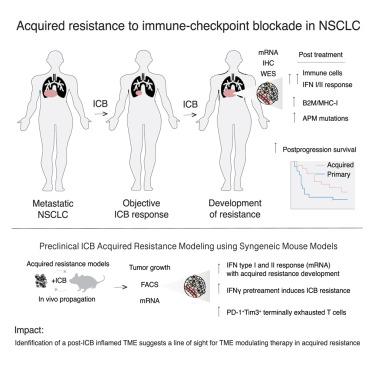当前位置:
X-MOL 学术
›
Cancer Cell
›
论文详情
Our official English website, www.x-mol.net, welcomes your feedback! (Note: you will need to create a separate account there.)
Clinical and molecular features of acquired resistance to immunotherapy in non-small cell lung cancer
Cancer Cell ( IF 50.3 ) Pub Date : 2024-01-11 , DOI: 10.1016/j.ccell.2023.12.013 Danish Memon , Adam J. Schoenfeld , Darwin Ye , George Fromm , Hira Rizvi , Xiang Zhang , Mohamed Reda Keddar , Divij Mathew , Kyung Jin Yoo , Jingya Qiu , Jayon Lihm , Jayalaksmi Miriyala , Jennifer L. Sauter , Jia Luo , Andrew Chow , Umesh K. Bhanot , Caroline McCarthy , Chad M. Vanderbilt , Cailian Liu , Mohsen Abu-Akeel , Andrew J. Plodkowski , Nicholas McGranahan , Marta Łuksza , Benjamin D. Greenbaum , Taha Merghoub , Ikbel Achour , J. Carl Barrett , Ross Stewart , Pedro Beltrao , Taylor H. Schreiber , Andy J. Minn , Martin L. Miller , Matthew D. Hellmann
Cancer Cell ( IF 50.3 ) Pub Date : 2024-01-11 , DOI: 10.1016/j.ccell.2023.12.013 Danish Memon , Adam J. Schoenfeld , Darwin Ye , George Fromm , Hira Rizvi , Xiang Zhang , Mohamed Reda Keddar , Divij Mathew , Kyung Jin Yoo , Jingya Qiu , Jayon Lihm , Jayalaksmi Miriyala , Jennifer L. Sauter , Jia Luo , Andrew Chow , Umesh K. Bhanot , Caroline McCarthy , Chad M. Vanderbilt , Cailian Liu , Mohsen Abu-Akeel , Andrew J. Plodkowski , Nicholas McGranahan , Marta Łuksza , Benjamin D. Greenbaum , Taha Merghoub , Ikbel Achour , J. Carl Barrett , Ross Stewart , Pedro Beltrao , Taylor H. Schreiber , Andy J. Minn , Martin L. Miller , Matthew D. Hellmann

|
Although immunotherapy with PD-(L)1 blockade is routine for lung cancer, little is known about acquired resistance. Among 1,201 patients with non-small cell lung cancer (NSCLC) treated with PD-(L)1 blockade, acquired resistance is common, occurring in >60% of initial responders. Acquired resistance shows differential expression of inflammation and interferon (IFN) signaling. Relapsed tumors can be separated by upregulated or stable expression of IFNγ response genes. Upregulation of IFNγ response genes is associated with putative routes of resistance characterized by signatures of persistent IFN signaling, immune dysfunction, and mutations in antigen presentation genes which can be recapitulated in multiple murine models of acquired resistance to PD-(L)1 blockade after IFNγ treatment. Acquired resistance to PD-(L)1 blockade in NSCLC is associated with an ongoing, but altered IFN response. The persistently inflamed, rather than excluded or deserted, tumor microenvironment of acquired resistance may inform therapeutic strategies to effectively reprogram and reverse acquired resistance.
中文翻译:

非小细胞肺癌免疫治疗获得性耐药的临床和分子特征
尽管PD-(L)1阻断免疫治疗是肺癌的常规治疗,但人们对获得性耐药知之甚少。在接受 PD-(L)1 阻断治疗的 1,201 名非小细胞肺癌 (NSCLC) 患者中,获得性耐药很常见,超过 60% 的初始应答者出现获得性耐药。获得性耐药显示炎症和干扰素 (IFN) 信号传导的差异表达。复发的肿瘤可以通过 IFNγ 应答基因的上调或稳定表达来分离。IFNγ反应基因的上调与假定的耐药途径相关,其特征是持续的IFN信号传导、免疫功能障碍和抗原呈递基因突变,这些特征可以在IFNγ后对PD-(L)1阻断获得性耐药的多种小鼠模型中重演。治疗。NSCLC 中对 PD-(L)1 阻断的获得性耐药与持续但改变的 IFN 反应相关。获得性耐药的持续发炎而非排除或遗弃的肿瘤微环境可能会为有效重新编程和逆转获得性耐药的治疗策略提供信息。
更新日期:2024-01-11
中文翻译:

非小细胞肺癌免疫治疗获得性耐药的临床和分子特征
尽管PD-(L)1阻断免疫治疗是肺癌的常规治疗,但人们对获得性耐药知之甚少。在接受 PD-(L)1 阻断治疗的 1,201 名非小细胞肺癌 (NSCLC) 患者中,获得性耐药很常见,超过 60% 的初始应答者出现获得性耐药。获得性耐药显示炎症和干扰素 (IFN) 信号传导的差异表达。复发的肿瘤可以通过 IFNγ 应答基因的上调或稳定表达来分离。IFNγ反应基因的上调与假定的耐药途径相关,其特征是持续的IFN信号传导、免疫功能障碍和抗原呈递基因突变,这些特征可以在IFNγ后对PD-(L)1阻断获得性耐药的多种小鼠模型中重演。治疗。NSCLC 中对 PD-(L)1 阻断的获得性耐药与持续但改变的 IFN 反应相关。获得性耐药的持续发炎而非排除或遗弃的肿瘤微环境可能会为有效重新编程和逆转获得性耐药的治疗策略提供信息。



























 京公网安备 11010802027423号
京公网安备 11010802027423号